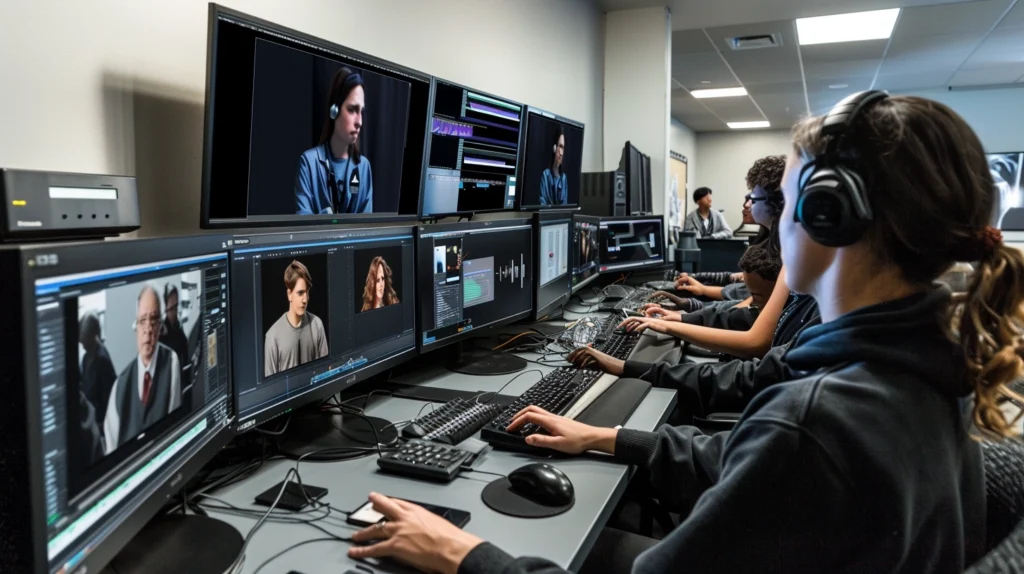Introduction

Did you know that, according to recent studies, content marketing generates over three times as many leads as outbound marketing and costs 62% less? In a digital landscape where every click could turn into a customer and every post has the potential to go viral, the value of content cannot be overstated. As businesses strive to cut through the noise of a crowded online space, the demand for skilled content editors has never been higher.
If your primary goal is to secure the most effective job description template available, look no further. By clicking the link below, you can download our complimentary job description template for a content editor. This meticulously crafted document embodies the essential principles and best practices of C9Staff’s esteemed hiring methodology, providing you with a robust foundation to tailor your own hiring specifications. Leverage this resource to streamline your recruitment process and attract top talent with precision
CONTENT EDITOR JOB DESCRIPTION TEMPLATE

Content editing goes beyond mere grammar checks and typo hunting; it is an essential strategy for enhancing communication efficacy and audience engagement. A content editor acts as a gardener, pruning unwieldy text, nurturing compelling narratives, and cultivating a brand’s voice across various platforms. This role is crucial not only for maintaining clarity and coherence but also for ensuring that the content aligns with the larger business goals and speaks directly to the audience’s needs and interests.
This article serves a dual purpose. First, it aims to equip aspiring content editors with the knowledge and tools needed to refine their craft and ascend in their careers. Whether you are just starting out or seeking to deepen your expertise, the insights provided here will help you understand the nuances of effective content editing. Second, it offers guidance for employers who are on the lookout for top-notch editorial talent. From crafting precise job descriptions to understanding what skills are most valuable in a potential hire, this guide will assist you in finding and nurturing the right talent for your organization.
As we delve into the art and science of content editing, you will discover that this field is as dynamic as it is vital. Prepare to explore everything from the basic principles of editing to advanced techniques that can set your content apart in a competitive market. By the end of this comprehensive exploration, you will not only appreciate the critical role of a content editor but also be better equipped to master it, ensuring your content performs optimally in today’s fast-paced, information-driven world.
Behind the Scenes: The Essential Guide to a Content Editor's Duties and Impact
The Role of a Content Editor

A content editor is not just a proofreader or a grammarian; rather, they are the architects of information, shaping raw data and ideas into compelling narratives that resonate with specific audiences. Their work encompasses a wide array of content types, from blogs and social media posts to technical reports and marketing copy. This versatility is essential as content editors navigate the varied landscapes of media, marketing, and corporate communications.
Key Responsibilities
The key responsibilities of a content editor can be summarized into several core areas:
Editing for Clarity and Style: Content editors refine text to ensure it communicates its message clearly and effectively. For instance, an editor working for a digital marketing firm might transform complex, jargon-heavy text into accessible content that engages the average reader without diluting its technical accuracy.
Proofreading for Accuracy: This involves a meticulous review of the final drafts to correct typographical, grammatical, and punctuation errors, ensuring the content meets the quality standards expected by the audience and maintains the credibility of the publisher.
Content Planning: Aligning content with business goals is a strategic aspect of their role. For example, a content editor at a nonprofit might develop an editorial calendar that schedules posts related to specific awareness months, aiming to maximize engagement and donations.
Collaboration: Content editors often work closely with writers, designers, and marketing teams to mold the final product. This collaboration might look like an editor in a tech company coordinating with technical experts and graphic designers to produce a detailed infographic that breaks down complex data for the company’s users.
Skills Required
Content editors must possess a mix of soft and hard skills to succeed:
Soft Skills:
Communication: Essential for articulating vision, providing clear feedback, and collaborating effectively with diverse teams.
Adaptability: The digital landscape is ever-changing, requiring editors to continually adapt their strategies to new platforms and audience behaviors.
Creativity: Driving engagement through innovative content presentation and storytelling that captivates and informs.
Hard Skills:
SEO Knowledge: Understanding how to optimize content for search engines is crucial for ensuring that articles and posts are discovered by targeted audiences.
CMS Familiarity: Proficiency with platforms like WordPress or Joomla allows editors to effectively manage and publish content, incorporating elements such as metadata and keywords that enhance searchability and user engagement.
Crafting Words vs. Perfecting Pages: 4 Key Differences Between Content Writers and Editors
Pathways to Becoming a Content Editor

While there is no one-size-fits-all educational path to becoming a content editor, certain degrees and certifications can provide a solid foundation. Degrees in English, Journalism, Communications, and Marketing are particularly relevant, each offering unique skills that are invaluable in content editing. An English degree emphasizes critical thinking and comprehensive writing skills, Journalism teaches the art of storytelling and factual accuracy, Communications focuses on effective messaging and audience engagement, and Marketing introduces strategic promotional skills. Additionally, certifications in technical writing, digital marketing, or specialized content editing programs can enhance these traditional educational routes, equipping you with specific, job-ready skills.
To build experience in the field, aspiring content editors are encouraged to seize opportunities for internships, freelancing, and contributions to online platforms. Internships, particularly at publishing houses or digital marketing firms, provide invaluable industry insights and professional connections. They offer a real-world understanding of the content lifecycle from creation to publication. Freelancing and contributing to blogs, websites, or social media allow for the development of a versatile portfolio. This hands-on approach not only showcases a range of skills and content types but also demonstrates your ability to adapt to various editorial styles and target audiences.
Familiarity with essential tools and software is crucial for any aspiring content editor. Grammarly, for example, assists with grammar and style checking, ensuring content is error-free and polished. The Hemingway Editor is an excellent tool for enhancing readability, helping simplify complex sentences and reduce passive voice. Additionally, proficiency in Adobe Suite is beneficial for those who work with multimedia content, allowing for the integration of visual elements that complement and enhance textual communication. These tools collectively help refine content to meet professional standards and align with audience expectations.
Are you ready to supercharge your career and land your dream job? C9Staff is here to guide you on your journey. We invite you to click the link below and submit your resume to our talent acquisition department. If your qualifications align with our client requirements, we will contact you to explore potential opportunities that match your profile. This is your chance to connect with leading employers and make a significant leap in your career trajectory. Don’t wait—submit your resume today and take the first step towards your future.

Hiring a Content Editor: A Guide for Employers

Identifying the right type of content editor starts with a clear understanding of your company’s content strategy and business objectives. Are you seeking a creative visionary, a meticulous proofreader, or perhaps a jack-of-all-trades? The type of editor you need depends heavily on the variety of content your company produces and its long-term marketing strategies. Whether your focus is on engaging short-form social media content, in-depth technical reports, or compelling marketing materials, aligning the editor’s skills with your content goals is crucial.
When writing a job description, it’s essential to create a compelling narrative about the role. A well-crafted job description not only outlines the necessary skills and qualifications but also highlights the unique opportunities your company offers. Be sure to include key responsibilities, required experiences, and the personal attributes that fit well with your company culture. These elements should be designed to attract the right candidates who are not only capable but also enthusiastic about the role.
Moving on to evaluating candidates, it’s important to review portfolios for diversity of content and attention to detail. During interviews, assess candidates’ ability to articulate their editing process and decision-making. Look for evidence of both technical skills and soft skills like communication and teamwork, which are crucial for a content editor who needs to collaborate effectively with different departments. Practical exercises, such as editing a sample piece, can also help gauge a candidate’s real-world capabilities.
Effective onboarding and training are key to integrating new editors smoothly into your teams. Ensure that your onboarding process includes introductions to team members, detailed reviews of current projects, and access to essential editing tools and resources. Training should be ongoing to keep skills sharp and up to date with the latest content trends and technologies. Consider regular workshops and feedback sessions to foster continuous professional growth and adaptation to evolving content needs.
Conclude by emphasizing the importance of this process: “Investing time in identifying, hiring, and training the right content editor will enhance your team’s capabilities and ensure your content consistently meets the highest standards of quality and effectiveness. Remember, the right editor is not just a staffer but a strategic partner in achieving your business goals.”
If your primary goal is to secure the most effective job description template available, look no further. By clicking the link below, you can download our complimentary job description template for a content editor. This meticulously crafted document embodies the essential principles and best practices of C9Staff’s esteemed hiring methodology, providing you with a robust foundation to tailor your own hiring specifications. Leverage this resource to streamline your recruitment process and attract top talent with precision
CONTENT EDITOR JOB DESCRIPTION TEMPLATE

Advanced Skills and Career Advancement

To excel as a content editor, mastering advanced editing techniques is crucial. These techniques include a thorough understanding of various style guides, such as APA, MLA, or Chicago style, which are essential for maintaining consistency and accuracy across texts. Familiarity with these guides ensures that an editor can adapt to the specific formatting and citation requirements of different types of content, from academic papers to business reports.
Additionally, effective audience analysis is key to tailoring content to meet specific needs and preferences. This involves understanding the demographics, interests, and behaviors of your target audience to create content that resonates and engages. Furthermore, in today’s visually driven digital landscape, multimedia content editing is increasingly important. This encompasses the ability to integrate text with images, video, and interactive media to enhance the storytelling experience and increase engagement.
Next, let’s explore potential career pathways within the editing world and related fields. The career opportunities in content editing are vast and varied. From starting as a junior editor at a small digital marketing firm to progressing to a senior content strategist for a multinational corporation, the paths are diverse. Aspiring editors can advance to roles such as lead editor, content manager, or communications director. Each role contributes uniquely to the broader content strategy of an organization, influencing key decisions and guiding the content team towards achieving the company’s strategic objectives.
The importance of continued learning and development cannot be overstated in a field that constantly evolves with new technologies and market trends. It is essential for content editors to engage in ongoing education through workshops, webinars, and courses. Emerging areas such as SEO optimization, data analytics, and user experience (UX) design are particularly valuable. Online learning platforms like Coursera or LinkedIn Learning offer specialized courses aimed at enhancing specific editing skills, helping editors stay ahead of industry advancements and maintain a competitive edge.
By advancing your skills and exploring new career avenues, you not only enhance your own capabilities but also significantly contribute to the success of any content-driven enterprise. Stay curious, stay informed, and never stop learning. The journey of a content editor involves continual growth and adaptation, making it a dynamic and rewarding career path.
The Future of Content Editing
As we look to the future, the integration of AI and machine learning into content editing tools is not just an innovation; it’s becoming a necessity. These technologies are transforming how content is created, optimized, and personalized, offering unprecedented efficiency and accuracy. Automated grammar correction tools are now sophisticated enough to adapt to different stylistic guidelines, while AI-driven style analysis can suggest edits that align with brand voice more consistently than ever. Moreover, content personalization algorithms are enabling editors to craft messages that resonate with individual user preferences, significantly enhancing user engagement.
In a global marketplace, content editors are required to navigate a complex landscape of multicultural communication and global audience engagement. The challenges here are vast, from ensuring language translation accuracy to adapting content for cultural relevance across diverse regions. However, these challenges also present opportunities for content editors to lead initiatives on global content strategies, facilitating broader market reach and deeper audience connection.
Further emphasizing the role of content editors, sustainability in content practices is becoming increasingly crucial in maintaining trust and integrity in digital communications. Content editors play a pivotal role in advocating for and implementing sustainable practices, such as ensuring the accuracy of information and promoting ethical standards that discourage misleading content. By fostering transparency and responsibility, editors help build a trustworthy media landscape, which is essential in an era of information overload and skepticism.
Concluding this section, as a content editor, your ability to adapt to these changes and embrace new technologies will not only enhance your career but also shape the future of digital communications. Stay informed, stay ethical, and lead the way in creating meaningful and impactful content. Your role is evolving, and with it, your opportunities to influence the media landscape grow. By staying at the forefront of technological advancements and ethical practices, you will not only secure your place in the industry but also contribute to its integrity and sustainability.
Employers seeking to elevate their content team, C9Staff extends an exclusive invitation to discover how our comprehensive services can enhance your sourcing, recruiting, hiring, training, managing, and deploying processes for a content editor role. By clicking the link below, you can schedule a free exploratory call with one of our knowledgeable account managers. During this call, we will attentively listen to your needs, recommend potential candidates at no cost, and assist you in evaluating the finest talent available at competitive prices. Don’t miss this opportunity to optimize your recruitment strategy

Conclusion

We’ve explored the multifaceted role of content editors and the critical skills required to excel in this dynamic field, from the fundamentals of editing to advanced techniques and the impact of emerging technologies. Throughout, we’ve examined the dual perspective addressed: the aspirational pathway for those seeking to become content editors and the strategic insights for employers looking to hire top-tier editorial talent. Whether you aim to enhance your editorial skills or seek the perfect candidate to elevate your content, the insights provided here serve as a foundational guide.
To those aspiring to make their mark as content editors, leverage the insights and strategies discussed to enhance your skills and advance your career. Immerse yourself in continuous learning, seek opportunities for hands-on experience, and stay abreast of the latest tools and trends that can set you apart in the competitive field of content editing.
For employers, consider how a refined hiring strategy can bring exceptional editors into your team, thereby elevating your content strategy to new heights. From identifying the right skills and creating compelling job descriptions to integrating and training new hires effectively, every step you take should aim to fortify your organization’s content capabilities.
We value your input and experiences. Please comment below with your thoughts or questions about content editing, or share how these strategies have impacted your professional journey. Your insights not only enrich our community’s understanding but also foster a dialogue that can lead to greater discoveries and improvements in the field of content editing.
Stay curious, stay informed, and remain at the forefront of content innovation. The world of content editing is ever-evolving, and by staying engaged with new developments and ethical practices, you ensure that your work or your team consistently meets the highest standards of excellence and relevance in the digital age.




